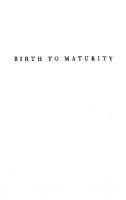Child Development from Birth to Eight : A Practical Focus [1 ed.] 9781907969621, 9781904787280
This timeless book is invaluable for anyone who needs practical information on under eights and their development, inclu
1,352 12 2MB
English Pages 89 Year 1993
Recommend Papers
![Child Development from Birth to Eight : A Practical Focus [1 ed.]
9781907969621, 9781904787280](https://ebin.pub/img/200x200/child-development-from-birth-to-eight-a-practical-focus-1nbsped-9781907969621-9781904787280.jpg)
- Author / Uploaded
- Jennie Lindon
File loading please wait...
Citation preview
Child Development from Birth to Eight A Practical Focus Jennie Lindon
tl
national children's bureau making a difference
[BLANK PAGE]
Child Development from Birth to Eight A Practical Focus
CHILD DEVELOPMENT FROM BIRTH TO EIGHT
Published by the National Children’s Bureau 8 Wakley Street London EC1V7QE Tel: +44(0)20 7843 6000
Registered Charity No. 258825
© National Children’s Bureau 1993 Reprinted 1994, 1999, 2004, 2006
ISBN: 1 904787 282 Ebook ISBN: 978-1-907969-62-1
Printed by CPI Bath
All rights reserved. No part of this publication may be reproduced, stored in a retrieval system or transmitted in any form by any person without the written permission of the publisher.
As an umbrella body for the children’s sector in England and Northern Ireland, we provide essential information on policy, research and best practice for our members and other partners. NCB promotes the voices, interests and well-being of all children and young people across every aspect of their lives.
Contents Page Acknowledgements Foreword The author
IV V
VI
Introduction
1
Part one: Making sense of child development
3
Part two: Looking at children as a whole
11
Part three: Development and change from birth to eight years • Physical development- the large movements • Physical development - coordination • The development of communication • The development of thinking • The growth of self care and responsibility • Personal development, emotions and relationships
19 23 31 39 49 59 67
Final thoughts
75
Further reading
76
Index
78
All photographs in this book are posed by models. Cover photograph by John Birdsall.
iv
CHILD DEVELOPMENT FROM BIRTH TO EIGHT
Acknowledgements This booklet was developed from a resource on child development included in Ensuring Standards in the Care of Young Children - a training pack for officers registering or inspecting day care under the Children Act 1989 published by the National Children's Bureau. The original material benefited from the suggestions given by members of the group who worked on that publication. I am grateful to the following people who gave constructive suggestions for re-drafting the material as a separate publication for a wider potential readership: Babette Brown, Early Years Trainers Anti-Racist Network Margaret Buttigieg, Director, Health Visitors' Association Mary J ane Drummond, Cambridge Institute of Education Janet Evans, Head, Ditton Fields Nursery School, Cambridge Sheila Gatiss, Preschool Playgroups Association Sue Griffin, National Childminding Association Margaret Hanney, Head, Early Childhood Unit (Wales) Jane Lane, Education Officer, Commission for Racial Equality Carol J oseph, Black Child Care Network Gillian Pugh, Director, Early Childhood Unit Dorothy Rouse, Development Officer, Early Childhood Unit Maureen Smith, National Nursery Examination Board Jill Wheeler., Probation Officer, London. John Wheeler, Assessment and Care Plan Manager, Westminster Social Services Sheila Wolfendale, Department of Psychology, University of East London I .have written the material with a full commitment to the values that underpin all the work of the Early Childhood Unit. I take responsibility, of course, for the particular way of expressing views about children and organising the material on development. Jennie Lindon March 1993
v
Foreword
One of the B.ureau's central purposes .has always been to raise awareness of the needs and rights of children, and we are therefore delighted that J ennie Lindon has been able to expand some earlier work that she did for the Early Childhood Unit into this accessible and authoritative book on child development from birth to eight years. Raising awareness is important, but it is not sufficient in itself: we don't only need to know how children learn and develop, but also how to ensure that adults understand that learning and development, and know how they can support it. In their first eight years children are growing and developing at a breathtaking rate. But whilst all children pass through similar stages in their development, each child is unique. And just as children will always vary as individuals, so will the way in which families bring up their children be different. In responding to children and their families, we may recognise common patterns, but we must be wary of generalisations. As the book points out, there are many different ways to raise healthy childreh. Large numbers of people come into contact with young children during the course of their daily lives. Some work directly with them - teachers, health visitors, playgroup leaders, childminders, nursery workers, play workers; others are with children less frequently but need to understand how they grow and develop and how to respond appropriately to them - social workers, police officers, registration and inspection officers looking at the quality and care offered by nUliseries. And of course parents, who know their children better than anyone, but sometimes want to look at them within a broader context. We hope that this short book will make an important contribution to all adults' understanding and enjoyment of children. I would like to thank the Department of Health and Halifax Building Society for their kind contributions towards the production of this book. Gillian Pugh Early Childhood Unit National Children's Bureau July 1993
CHILD DEVELOPMENT FROM BIRTH TO EIGHT
vi
The author Jennie Lindon is a psychologist and works as an independent consultant and trainer. She has written numerous articles and books on children and their families - most recently - Caring for the Under-8s - working to achieve good practice published by Macmillan and Your Child from 5-11 published by Hodder and Stoughton.
INTRODUCTION
Introduction
What are the aims of this book? The'main aims are to provide: • some pointers on ·how to make sense of child development, including the reas






![Practical Kanban: From Team Focus to Creating Value [Kindle Edition]
9783903205000, 9783903205055, 9783903205048](https://ebin.pub/img/200x200/practical-kanban-from-team-focus-to-creating-value-kindle-edition-9783903205000-9783903205055-9783903205048.jpg)

![Experiences In Movement & Music: Birth To Age Eight [5th Revised ed.]
1111838054, 9781111838058](https://ebin.pub/img/200x200/experiences-in-movement-amp-music-birth-to-age-eight-5th-revised-ed-1111838054-9781111838058.jpg)
